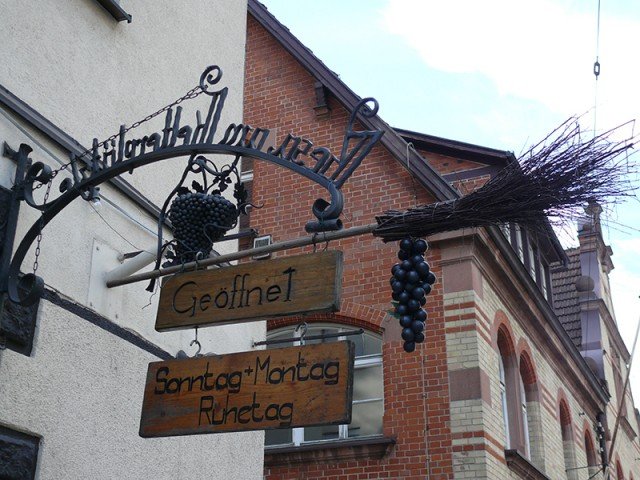
By Teri Weiss
Special to The Citizen
There are a number of Swabian customs and traditions, as well as religious holidays and fests, to warm us up during the colder days of fall in Germany.
While stationed here in Stuttgart, you should get to know about an ancient and truly local tradition of the area, “Besenwirtschaften,” or broomstick inns.
These temporary taverns, or wine bars, open for just four months in the fall. Besen have been around since the ninth century. Over the past 1,200 years, regional vintners maintained the practice of serving their own “Most,” or Swabian cider, as well as recently harvested wines, as long as the supply lasts. To this day, it all takes place in their own home, barn or basement, spare room or even garage converted for the occasion into a cozy setting for friendly and rustic get-togethers.
You may have seen a broom or broom emblem hanging over a garden gate or above an entrance door: It’s called a “Besa,” the Swabian word for “Besen,” or broom to identify being open for business.
Typically, it’s a long-handled birch or brush broom with colored ribbons and streamers entwined between the bristles. However, it could also be a wreath or just some shrub twigs or sprigs of pine to indicate that people will find a temporary wine bar there.
It’s mainly during this time of year when broomstick inns are open and the locals, Badeners and Württembergers, like to “go by the broom.”
The respective Besenwirtschaft owners are bound by law to follow strict regulations. They are allowed to operate only four months of the year divided in to two phases, typically between November and early March, and may serve up to 40 people at a time. Hygiene inspectors control Besenwirtschaften weekly to ensure health and safety standards are met.
Legalities aside, Besenwirtschaften can be considered as unique, gastronomic rarities, certainly not common places for wining and dining.
Vintners welcome their guests with their “young” or “new” homemade wine called “Most” and various wines from last season’s harvest. Served along with these delightful beverages are solid brown breads, rolls and hearty homemade sausages, smoked hams, cutlets, sauerkraut and potato salad.
The mouth-watering fragrances waft through the Besenwirtschaft as guests indulge in light red Trollinger or Lemberger wines, or clear white Müller-Thurgau or Sylvaner wines, mostly quite dry.
Guests may linger as long as they like at this type of affordable enjoyment and the hearty, but simple food, local wines and good company make for a memorable atmosphere.
Typically, foreign visitors, including Americans, often times refer to the German “Gemütlichkeit,” or coziness, and that’s what Besenwirtschaften are all about. Visitors may discover that a Besenwirtschaft is a good place to test some German phrases or have their newly found Swabian neighbours practice their English.
In fact, one might be surprised how easy it will be to speak German after a “Viertele,” a quarter-liter of local red or white Wüerttemberger wine, or, if one’s really brave, a glass of Swabian cider.
Give it a try for a really memorable cultural experience. Prost, und zum Wohl!
To find a Besen in the greater Stuttgart area, visit www.besentermine.de.
Stuttgart-Plieningen: www.plieningerbesen.de/
Stuttgart-Hofen: www.weinbau-nerz.de/
Stuttgart-Degerloch: www.beiderelsbeth.de/
Stuttgart-Obertürkheim: www.karl-woehrwag.de/
Stuttgart-Untertürkheim: www.weinhof-zaiss.de/
